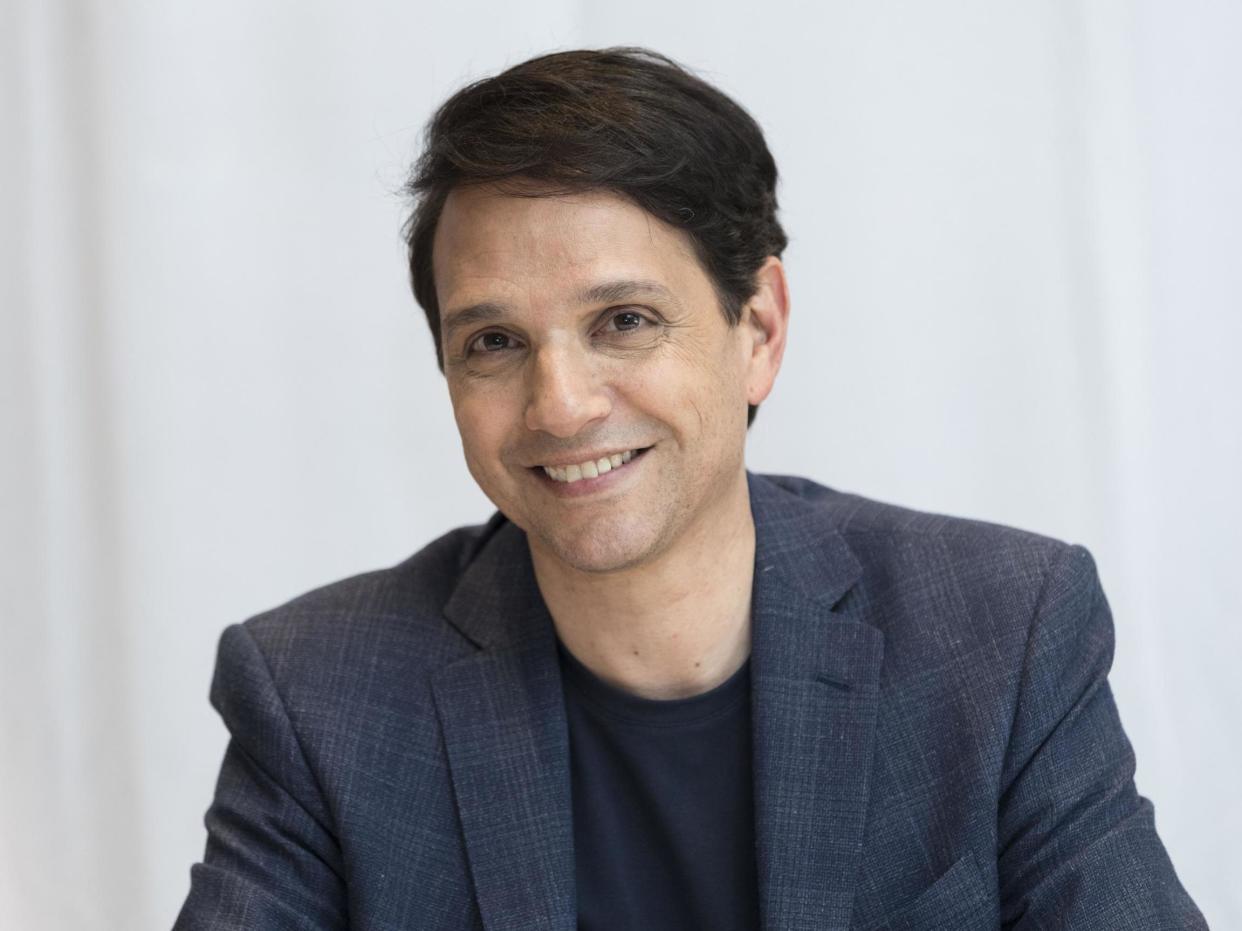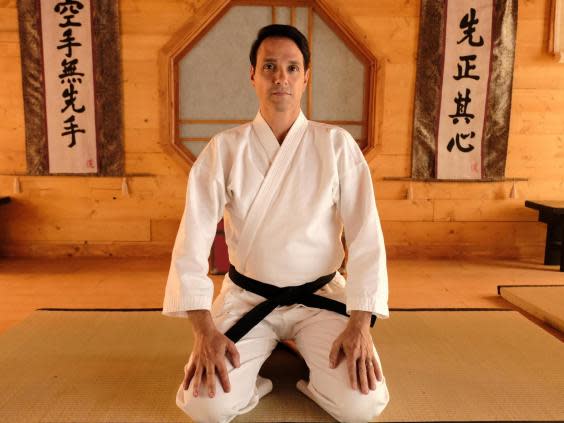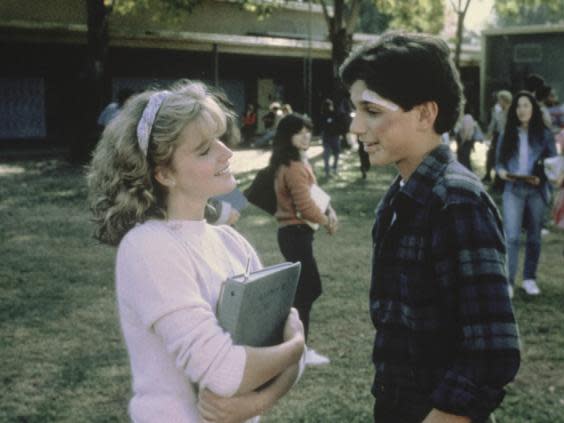Ralph Macchio: ‘The Karate Kid is like the best cheeseburger you ever had’

I still carry this Kid title, even though I’m far from it,” says Ralph Macchio. “I’ll hang on to it as long as I can.” The New York-born actor, who shot to fame in 1984’s The Karate Kid, after impressing in Francis Ford Coppola’s The Outsiders, has never really shed this persona – that of the wide-eyed kid, the quintessential Hollywood nice guy. Now 58 – but “still with my youthful appearance...ish” – Macchio is bringing back The Karate Kid’s boy hero, Daniel LaRusso, as an older, more complicated man.
He does so in Cobra Kai, the serialised Karate Kid sequel originally produced for YouTube Premium (formerly YouTube Red). Cobra Kai sees LaRusso sharing the spotlight with old rival Johnny Lawrence (William Zabka), now in the role of washed-up underdog, as they reignite their old feud, training a new generation of adolescent fighters. From Friday, the first two seasons of Cobra Kai are being made available to watch on Netflix, with a brand new third season produced just for the streaming giant arriving next year.
Macchio speaks enthusiastically of his new series during our half-hour phone interview, insisting that, amid a landscape glutted with reboots and remakes, Cobra Kai stands out from the crowd. “These guys that write the show are the three biggest Karate Kid fans you will ever meet; they know way more about those films than I do. I think that’s why it sets itself atop that list; it really makes the long-time fans feel celebrated – it just stirs up all that good comfort food of yesterday.
“The Karate Kid is just one of the films of that era, I guess Back to the Future would be the other, that really has stood the pop culture test of time,” he continues. “As much as you have to sell the poster, people already know what the poster is; it’s warm and fuzzy – it’s like the best cheeseburger you ever had. And you get to taste it again.”
While Cobra Kai remains faithful to the characters established in the movie and its two sequels – it allows Macchio to add a little more shade to his performance. “The Karate Kid was a very black and white film,” he says. “Good over evil. Daniel good, Johnny bad. Miyagi good, Sensei Kreese bad. Cobra Kai blurs those lines – your allegiance changes episode to episode.”

If Cobra Kai lets him reveal his darker side, his stint on The Deuce – David Simon and George Pelicanos’s superb HBO series about the New York sex industry across the Seventies and Eighties – gave him the chance to play bad cop, in every sense of the term. As Officer Haddix, Macchio is an uninspiring and cynical embodiment of police apathy and corruption. “Obviously the corruption of the New York Police Department in the Seventies was just rampant,” says Macchio. “Then, there was corruption and crime… massive money being made under the table. The drugs were part of it.”
Macchio is keen to draw a distinction between the police as depicted in The Deuce and the NYPD of today: “It is not a rampant corruption in my view, throughout, like it was in the Seventies and early Eighties. I think what happens now is things get so highly politicised, under a magnifying glass of social media. In a nanosecond there’s one thing you see, and it’s swept all across Instagram and Twitter, and the perspective and what it really is becomes something else. We’re in an ugly place as far as that goes right now. Technology gives you the ability to shine a light on something, even though it may not be clear what you’re looking at.”
“I really miss The Deuce,” says Macchio – though the series’ third and final season only aired last year. “Not that it wasn’t well-respected, but it needs to be seen by more people, and hopefully in time, it will be. I loved being a part of it. Maggie Gyllenhaal‘s work and [James] Franco and some of the other cast, like Emily Meade – there were spectacular hero performances. The women were so strong on that show.”
The Deuce’s setting, meticulously recreated by the series’ art directors and production designers, transported Macchio back to his own history in New York. “I remember walking through Times Square with my parents when I was 11, 12 years old, going to see my first Broadway show – the smell and the look of that section of New York City. There were times I watched The Deuce and I really believed I was smelling that smell.
“I remember putting on those plaid suits and those big wide ties; I looked like my dad. I remember my uncle dressing like that. So it was fun to step back in time, because I grew up in and around New York my whole life. I was in a play with Robert De Niro called Cuba and his Teddy Bear in 1986, around [the time that] the end of season three of The Deuce [is set]. I remember that time well, that sort of transformation through the early stage of the porn industry, into Aids, how it all got cleaned up. Now it’s Disneyland.”
Macchio has performed in other plays – he took over Matthew Broderick’s role for the US national tour of the musical How to Succeed in Business (Without Really Trying) – and he shares the concern of many actors for the future of Broadway amid the ongoing pandemic. “I don’t know when theatre opens up,” he says, “I really don’t. It’s very upsetting, what’s happening to the Broadway community.”

Despite the recent success of The Deuce and Cobra Kai, though, Macchio is still better known as a film actor. He describes his time spent working for directors like Coppola and Walter Hill (on Crossroads in 1983) as “school”. “You absorb so much at that age,” he says. “Often, as well, I would hang out with the cinematographers, some of the great cinematographers of those beautiful-looking films, like Stephen Burum and John Bailey. I was still willing to ask, ‘why are you using that lens?’ and ‘what that does, and how this works... I was probably annoying, but I loved all that stuff. When I wasn’t shooting, I was always hanging out on the set, and I’d be even hanging out with the assistant camera guy, just learning about that.” It was experience that would prove vital to Macchio when he later stepped behind the camera, to direct his own short films.
After starring alongside Joe Pesci and Marisa Tomei in the beloved 1992 legal comedy My Cousin Vinny, Macchio saw the work start to dry up. The “lean years”, as he wryly refers to them, lasted throughout most of the 1990s. “Sometimes I might have played things a little safe, once the cameras rolled,” he muses. “I think I would tell my younger self to maybe take some more creative risks. Maybe if I attacked things differently, I would have found some other opportunities.”
Still, Macchio says, “I don’t regret the choices I made. When I look at a film like The Outsiders, which was my first big cinema role, I felt I was right in the centre of that character. I feel very proud of what I did there.
“I’m always checking the parachute before I jump out,” he adds. “I know a lot of people jump and then deal with the parachute on the way down. But that’s just part of who I am.”
Seasons one and two of Cobra Kai are available to watch on Netflix from Friday 28 August
Read more
Natalia Dyer: ‘The female orgasm is seen as surplus’
Stand by me: The cinematic legacy of River Phoenix
Safari on celluloid: Why B-movies can’t get enough of deadly creatures

 Yahoo Movies
Yahoo Movies 
